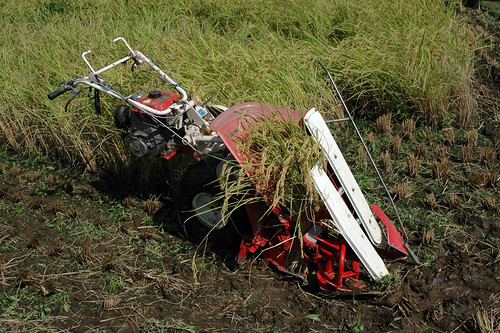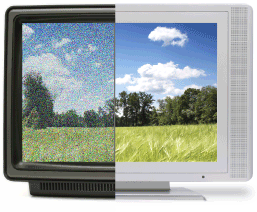Kalau Malaysia ada digital broadcasting, setiap negara yang setaraf kemajuan digitalnya dapat tune TV 3 atau RTM. Setakat ini orang dari luar negara Malaysia sudah boleh mendengar digital radio dari ERA dan RTM.
Sesudah disiapkan kemudahan digital broadcasting, TV analog tidak berfungsi lagi. Sesiapa juga di luar Jepun boleh layar laman dan menikmati rancangan TV Jepun hanya dengan masukkan alamat urlnya sahaja.
By YURI KAGEYAMA
The Associated Press
With signs that say "Digital is coming!" hanging in stores packed with new TV models promising dazzling imagery, Tokyo's bustling electronics shopping district in Akihabara is one place in Japan that's gung-ho about digital television broadcasting that began Monday.
Prime Minister Junichiro Koizumi (at microphone) and representatives of Japan's key TV broadcasters mark the start of terrestrial digital broadcasting.
But the buzz has yet to catch on elsewhere.
Digital broadcasting will still reach just parts of three major cities, and potential viewers are estimated at 12 million households. But with reception for some channels poor because of Japan's mountainous and cramped terrain, the tally may be half that -- and actual viewers even fewer, at about 300,000.
The government is determined to make digital broadcasting the nation's standard, and has vowed to phase out analog broadcasting by 2011. So officials say digital TV, despite its likely slow start, is here to stay.
The economic perks are expected to total 200 trillion yen over the next decade, according to the telecommunications ministry, as people rush out to buy digital TVs, broadcasters invest in equipment and new kinds of services blossom.
The government is investing 180 billion yen to help get the system started, and is targeting the end of 2006 for making it available nationwide.
The air waves for analog TVs and digital TVs are basically similar. But using digital signals allows for relaying larger amounts of information. A digital TV has twice as many lines on a screen to create images as an analog TV, delivering a more vivid and theaterlike picture. Digital broadcasting can also relay hundreds of channels in less dazzling video quality.
Another feature of digital TVs is viewer participation, including surveys, contest balloting or educational programs, although such programs were scarce Monday. The television can also receive data that pop up as words on the screen, including player statistics for a baseball game, or local news headlines and weather reports targeting specific areas.
In the future, commuters will be watching digital TV programs on mobile phones and other hand-held devices, although a disagreement over patents has delayed that launch in Japan.
The advent of digital TV is symbolic of a larger move toward "a network society" that delivers information catered to each individual instead of a dominant mass media that acts as opinion leader, said Tatsuo Inamasu, a professor at Hosei University in Tokyo.
"It means nothing other than the dismantling of TV by the Internet. Information is now becoming a two-way street," Inamasu said. "The connections among individuals are going to be (horizontal), rather than controlled (from) the top."
Japan has had satellite digital broadcast since 2001, drawing 4.7 million households so far. The new system is terrestrial and won't use satellites.
The United States has had terrestrial digital broadcasting since 1998, and other nations, including England, Sweden, Australia and South Korea, also already have it. The reception has been mixed. Spain's commercial terrestrial digital broadcasting network went bust.
In Japan, sales of cathode ray tube, or CRT, TVs still outpace plasma and liquid-crystal display TVs. But that's beginning to change.
For the first nine months of this year, LCD TV sales totaled 980,000, up 41 percent from the same period a year ago, while plasma TVs sales totaled 140,000, up 29 percent. And data show Japanese who are thinking of replacing their old TV sets are opting for LCD or plasma -- and for going digital.
The pace at which LCD and plasma TVs are selling rivals the speed with which black-and-white TVs gave way to color sets in the 1970s in Japan, the Nihon Keizai Shimbun, a major business daily, reported last week.
Digital broadcasting requires a tuner, which costs about 80,000 yen here. But fully enjoying its advantages requires a new TV set. Some models come with the tuner inside for an extra price. Interactive features require hooking the tuner to a phone line.
Prices on the TVs vary, but one with a 50-inch plasma screen, which delivers the visual splendor of a home theater, costs 800,000 yen.
"I want one but it's too expensive," cab driver Toshiaki Araki said. "The prices will drop once sales pick up."
The Japan Times: Dec. 2, 2003
(C) All rights reserved




 (fromdtvanswers.com)
(fromdtvanswers.com)


















